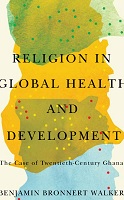Religion in Global Health and Development
The Case of Twentieth-Century Ghana
Author(s)
Walker, Benjamin Bronnert
Collection
WellcomeLanguage
EnglishAbstract
The COVID-19 pandemic has made evident that the field of global health – its practices, norms, and failures – has the power to shape the lives of billions. Global health perspectives on the role of religion, however, are strikingly limited. Uncovering the points where religion and global health have connected across the twentieth century, focusing on Ghana, provides an opportunity to challenge narrow approaches. In Religion in Global Health and Development Benjamin Walker shows that the religious features of colonial state architecture were still operating by the turn of the twenty-first century. Walker surveys the establishment of colonial development projects in the twentieth century, with a focus on the period between 1940 and 1990. Crossing the colonial-postcolonial divide, analyzing local contexts in conjunction with the many layers of international organizations, and identifying surprisingly neglected streams of personnel and funding (particularly from Dutch and West German Catholics), this in-depth history offers new ways of conceptualizing global health. Patchworks of international humanitarian intervention, fragmented government services, local communities, and the actions of many foreign powers combined to create health services and the state in Ghana. Religion in Global Health and Development shows that religion and religious actors were critical to this process – socially, culturally, and politically.
Keywords
World health; history; christianity; GhanaISBN
9780228010524, 9780228011699, 9780228011606, 9780228013662, 9780228011590Publisher
McGill-Queen’s University Press (mqup)Publisher website
https://www.mqup.ca/Publication date and place
Montreal, 2022Grantor
Classification
Medicine and Nursing
History


 Download
Download